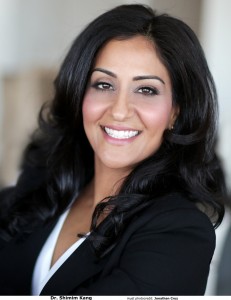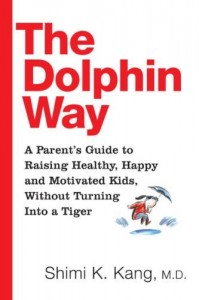Q & A with a VCH author
When writing her new book, The Dolphin Way: A Parent’s Guide to Raising Healthy, Happy and Motivated Kids – Without Turning a Tiger, Dr. Shimi Kang drew from her experiences working as a physician and psychiatrist at VCH.
VCH.
“I would say that as an addictions psychiatrist at VCH, I started learning the tools and techniques for self-motivation over 10 years ago,” says Dr. Kang who is the medical director for Child and Youth Mental Health for Vancouver community at VCH. “And I’ve been working everyday with clients who have anxiety, depression and addiction at VGH and all my jobs. I’ve seen how the tools I’ve learned can help individuals, how they can motivate them to change their behaviours. I thought to myself, ‘Why don’t parents know about these tools? Why are they just in our profession and not out in the broader population?’”
“It’s really helped my patients,” she says later, “but in the end it’s also really helped me because I have far more satisfaction with my work when I practise according to the dolphin way.”
Just days before a book signing at Kidsbooks (West Broadway location) on Saturday, April 26th at 3 pm, Dr. Kang chatted with VCH News about her new book and how it’s helped both her and her patients at Vancouver Coastal Health.
So explain how the Dolphin Way approach helps families.
Well, the Dolphin Way is a practical, science-based guide to raising healthy, happy and self-motivated kids – while addressing the issue of over-parenting head-on.
And why did you develop this therapy?
It’s the result of over 10 years of working with hundreds, if not thousands, of young people and families, of being a researcher of the science of self-motivation and also of being a parent myself of three. So I combined everything I knew from all of those roles and put it into a book that busy parent, like myself, would be able to benefit from.
How has your experiences working at VCH contributed to the book?
I would say that as an addictions psychiatrist at VCH I started learning the tools and techniques for self-motivation over 10 years ago. And I’ve been working everyday with clients who have anxiety, depression and addiction at VGH and all my jobs. I’ve seen how the tools I’ve learned can help individuals, how they can motivate them to change their behaviours. I thought to myself, “Why don’t parents know about these tools? Why are they just in our profession and not out in the broader population?” So I did my own research and added a lifestyle pieces like sleep, more recreation or play and a greater sense of connection to the community. So the Dolphin Way has a very strong lifestyle angle as well the parenting approach of not being the over-controlling “tiger” or the permissive “jellyfish” parent – this is a collaborative middle ground, it’s about balance.
Is it applicable to organizations as well?
Yeah, this analogy is definitely true for organizations. So an organization can have a very “tiger” culture where bosses and managers are overbearing or authoritarian. But many organizations can have a bit of a “jellyfish” culture where there are no rules, nobody knows what’s going on. The best organizations are the ones that are collaborative and are bit playful and recognize that bonding and connecting are a part of the workplace – that’s the dolphin approach.
From working at VCH, my experiences have been that it’s a very dolphin environment.
How have your patients at VCH benefitted from this approach?
Well, I’ve benefitted as a clinician to help my patients be more motivated to make the changes they want. And I’ve coached parents to use this collaborative method with their kids and also using it in their workplaces, in the grocery store, with their neighbours – to have this middle ground all the time and have rules and expectations but be flexible.
It’s really helped my patients but in the end it’s also really helped me because I have far more satisfaction with my work when I practise according to the dolphin way.


jas
would this book be available at any book store? i am interested in buying one.
Gen Handley
Hey Maureen, she uses the dolphin analogy because apparently dolphins are good examples of positive, balanced parenting.
Maureen
Sounds like an interesting and valuable book . . . curious why it’s called “The Dolphin Way”?